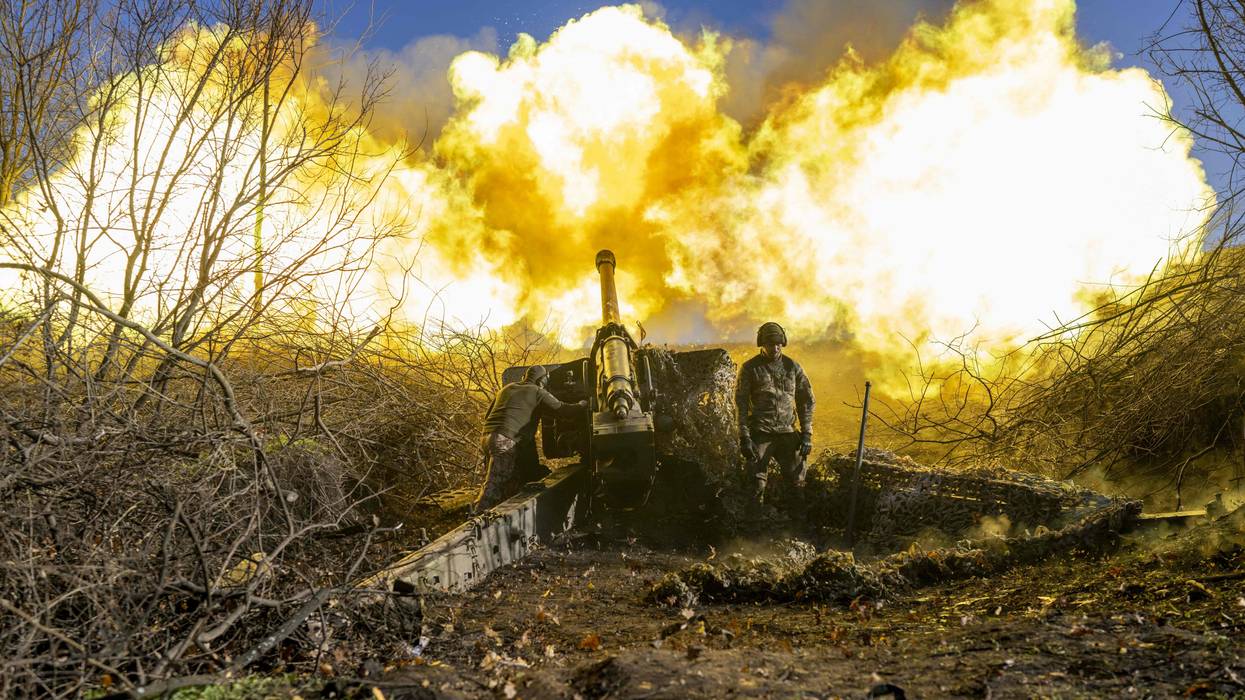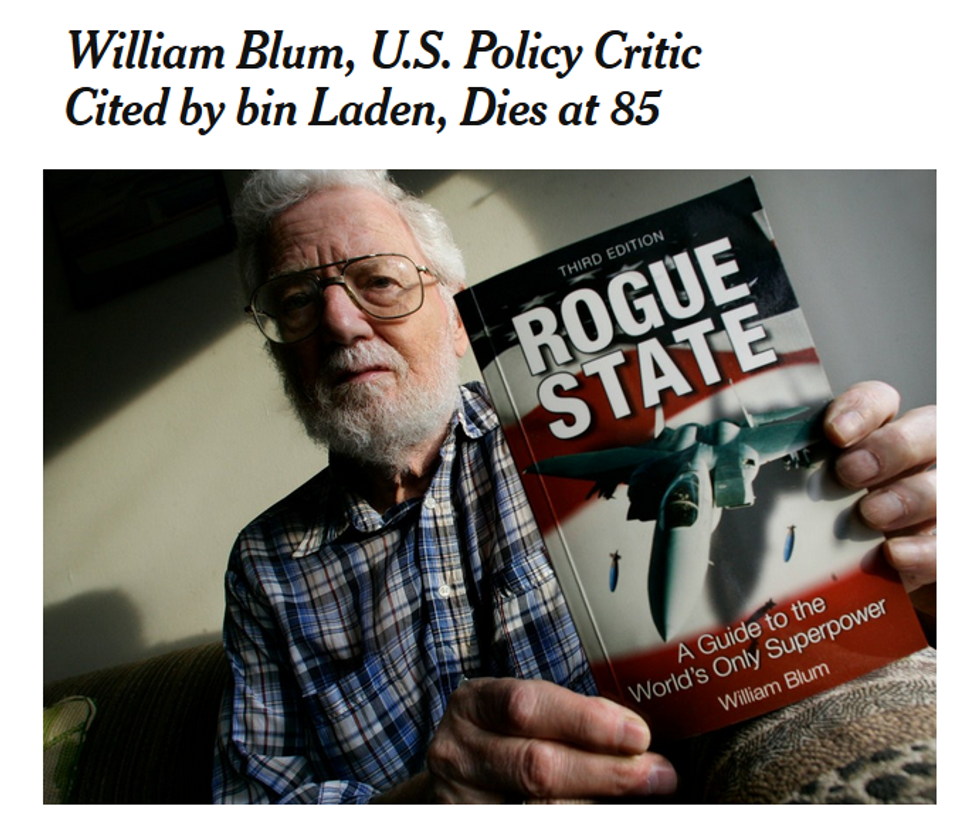Let me give you an example. But you need to bear with me here because I'm about to jump into the disordered mind of a man who, though two years younger than me, has what might be called--given present-day controversies--a borderline personality. I'm thinking of President Donald Trump, or rather of a particular moment in his chaotic recent mental life. As the New Year dawned, he chaired what now passes for a "cabinet meeting." That mainly means an event in which those present grovel before, fawn over, and outrageously praise him in front of the cameras. Otherwise, Trump, a man who doesn't seem to know the meaning of advice or of a meeting, held a 95-minute presidential ramble through the brambles in front of a Game of Thrones-style "[Iran] Sanctions Are Coming" poster of... well, him. The media typically ate it up, even while critiquing the president's understanding of that HBO TV series. And so it goes in the Washington of 2019.
Excuse me if I seem to be wandering off subject (another attribute of the aging mind), but I'm about to plunge into history and our president is neither a historian, nor particularly coherent. Read any transcript of his and not only does he flip from subject to subject, sentence by sentence, but even--no small trick--within sentences. In other words, he presents a translation problem. Fortunately, he's surrounded by a bevy of translators (still called "reporters" or "pundits") and, unlike the translators in the president's meetings with Russian President Vladimir Putin, we have their notes.
So here, as a start, is a much-quoted passage of his on this country's never-ending Afghan War from that cabinet meeting, which reporters and pundits jumped on with alacrity and criticized him roundly for:
"We're going to do something that's right. We are talking to the Taliban. We're talking to a lot of different people. But here's the thing -- because mentioned India: India is there. Russia is there. Russia used to be the Soviet Union. Afghanistan made it Russia, because they went bankrupt fighting in Afghanistan. Russia. So you take a look at other countries. Pakistan is there; they should be fighting. But Russia should be fighting.
"The reason Russia was in Afghanistan was because terrorists were going into Russia. They were right to be there. The problem is it was a tough fight. And literally, they went bankrupt. They went into being called Russia again, as opposed to the Soviet Union. You know, a lot [of] these places you're reading about now are no longer a part of Russia because of Afghanistan."
As I said, Donald Trump is no historian. So it's true that the Red Army didn't move into Afghanistan in 1979 thanks to a terrorist presence in Russia. And yes, every stray pen or talking head in Washington seemed to skewer the president for his ignorance of that reality, including the Atlantic's eminent neocon pundit David Frum who basically claimed that the president was simply pushing the latest dish of pasta Putinesca our way. ("It's amazing enough that any U.S. president would retrospectively endorse the Soviet invasion. What's even more amazing is that he would do so using the very same falsehoods originally invoked by the Soviets themselves: 'terrorists' and 'bandit elements.' It has been an important ideological project of the Putin regime to rehabilitate and justify the Soviet invasion and occupation of Afghanistan...")
While critics like Frum did begrudgingly admit that the Soviet fiasco in Afghanistan might have had just a teensy-weensy something or other to do with the implosion of the Soviet Union in 1991, less than two years after the Red Army limped home, the president, they insisted, basically got that wrong, too. The Soviet Union bankrupted by Afghanistan? Not in your dreams, buddy, or as the Washington Post's Aaron Blake wrote in a piece headlined "Trump's Bizarre History Lesson on the Soviet Union, Russia, and Afghanistan":
"The overlap between the fall of the Soviet Union and its foray into Afghanistan is obvious. The USSR invaded in 1979 and left a decade later, in 1989. The superpower dissolved shortly thereafter in 1991. But correlation is not causation... It was perhaps among the many reasons the USSR collapsed. But it was not the reason."
And then, of course, came the next presidential tweet, and everyone--except me--moved on with alacrity. I was left alone, still dredging through my memories of that ancient conflict, which, these days, no one but the president would even think of bringing up in the context of the ongoing U.S. war in Afghanistan. And yet here's the curious thing when it comes to an aging empire that prefers not to remember the history of its folly: Donald Trump was right that Russia's Afghan misadventure is a remarkably logical place to start when considering the present American debacle in that same country.
Two Empires Trapped in Afghanistan
Let me mention one thing no one's likely to emphasize these days when it comes to the Russian decision to enter that Afghan quagmire in 1979. At the highest levels of the Carter and then the Reagan administrations, top American officials were working assiduously to embroil the Soviets in Afghanistan and would then invest staggering sums in a CIA campaign to fund Islamic extremist guerrillas to keep them there. Not that anyone in Washington is likely to play this up in 2019, but the U.S. began aiding those Mujahidin guerrillas not after the Red Army moved in to support a pro-Soviet regime in Kabul, but six months before.
Here's how President Carter's national security advisor, Zbigniew Brzezinski, would describe the situation almost two decades later:
"According to the official version of history, CIA aid to the mujahidin began during 1980, that's to say, after the Soviet army invaded Afghanistan. But the reality, kept secret until now, is completely different: on 3 July 1979 President Carter signed the first directive for secret aid to the opponents of the pro-Soviet regime in Kabul. And on the same day, I wrote a note to the president in which I explained that in my opinion this aid would lead to a Soviet military intervention."
Asked if he had any regrets, Brzezinski responded:
"Regret what? The secret operation was an excellent idea. It drew the Russians into the Afghan trap and you want me to regret it? On the day that the Soviets officially crossed the border, I wrote to President Carter, saying, in essence: 'We now have the opportunity of giving to the USSR its Vietnam War.'"
Think about that largely missing bit of history for a moment. Top U.S. officials wanted to give the Soviet Union a version of their own disastrous Vietnam experience and so invested billions of dollars and much effort in that proxy war--and it worked. The Soviet leadership continued to pour money into their military misadventure in Afghanistan when their country was already going bankrupt and the society they had built was beginning to collapse around them. They were indeed suffering from what General Secretary Mikhail Gorbachev came to call "the bleeding wound." And if that isn't the language of disaster (or bankruptcy or, perhaps more accurately, implosion), what is? Yes, Afghanistan, that "graveyard of empires," wasn't the only thing that took their world down, but the way their much-vaunted army finally limped home a decade later was certainly a significant factor in its collapse.
Now, let me tax your memory (and especially elite Washington's) just a bit more. Think again about the history that led up to the American war President Trump was fretting about in that cabinet meeting. Under the circumstances, it wouldn't be an exaggeration to say that Brzezinski and his successors were just a tad too successful--or, to put it another way, that they lured not one but two empires into their trap; the second being, of course, the American one.
After all, in that 10-year Afghan proxy war (1979-1989), they laid the foundations for the creation by a rich young Saudi named Osama bin Laden of a resistance outfit of Arab fighters. You know, "al-Qaeda," or "the base." They also funded other extremist Islamic figures and groups like Gulbuddin Hekmatyar or the Haqqani network that would, more than a decade after the Soviets straggled home, go to war against... well, us. And through their investment in that brutal quagmire, they also helped lay the foundations for the destruction and destitution of significant parts of Afghanistan, and so for the brutal civil war that followed in the early 1990s amid the ruins. Out of that, of course, came another group whose name might still ring a bell or two: the Taliban.
Brzezinski & Co. laid the foundations for what would become a nearly 30-year American quagmire war.
In other words, Brzezinski & Co. laid the foundations for what would become a nearly 30-year American quagmire war (with a decade off between its two parts) in a land that, in 1979, few Americans other than a bunch of hippies had ever heard of. Here, then, is a small hint for the president: you might consider starting to refer to Afghanistan--and I assure you this would be historically accurate (even if you were roundly criticized for it by the Washington punditariat)--as America's "bleeding wound."
No matter how many years it goes on, one thing seems probable: like the Red Army, the U.S. military will finally limp out of that country in defeat and will also, in some way, bring that defeat home with them. It may not be what finally bankrupts or implodes the great(er) and far wealthier imperial power of the Cold War era, but as with Russia it will surely lend a helping hand.
There's No Success Like Failure in Washington
In a country in which implosive elements are already being mixed into its politics, President Trump had his finger on something when he brought up the Russian war in Afghanistan. However historically and syntactically mixed up he might have been, his brain was still far more on target than those of most of the wise men and women of the present Washington establishment.
Take David Frum. Who today thinks much about his role in the history of American folly? As a speechwriter for George W. Bush, however, he was memorably ordered to produce "in a sentence or two our best case for going after Iraq." In other words, he was to make a case for the invasion of that country in the president's 2002 State of the Union address. At that time, with America's superpower enemy, the Soviet Union, long gone and the U.S. seemingly unopposed on planet Earth, he somehow found three weak countries--Iraq, Iran, and North Korea--to turn into a World War II-style "axis of evil." In doing so, he produced this memorable passage for the president:
"States like these, and their terrorist allies, constitute an axis of evil, arming to threaten the peace of the world. By seeking weapons of mass destruction, these regimes pose a grave and growing danger. They could provide these arms to terrorists, giving them the means to match their hatred. They could attack our allies or attempt to blackmail the United States. In any of these cases, the price of indifference would be catastrophic."
Mission accomplished! No matter that neither Iraq, nor the other two countries were anywhere near having nukes.
Donald Trump has often been accused of megalomaniaas if that were a unique trait of his, but that's because we've blotted out Washington's other megalomaniacs of this century. I'm thinking of the neocon officials of the Bush administration with their urge to turn this planet into an American possession and their disastrous invasion of Iraq. Because of that sense of amnesia, David Frum, Mr. Axis of Evil, like the rest of his neocon companions has, a decade and a half later, risen again in Washington. Like him, many of them are now critics of the Trump administration, while others, like National Security Advisor John Bolton, are ascendant in that very administration.
In the end, when it comes to history and memory, it all seems to prove one thing: if you want to ensure your success in twenty-first-century Washington, there's no way you can be too wrong. (The key figures in that city these days are evidently only familiar with the first of those two famed lines in Bob Dylan's "Love Minus Zero": "She knows there's no success like failure/And that failure's no success at all.")
You now have 60 seconds (and the clock's already ticking) to answer a question: Who, in or out of the administration, critic, pundit, or official, was against the invasion of Iraq once upon a time? I think you know the answer to that one. If you were against the single most disastrous, megalomanic foreign policy act of this century, there's no place for you in present-day Washington, not in the administration, either party in Congress, or even in memory. You are not worth listening to, writing about, thinking about, or remembering in any way. You are the anti-Frum and have been deposited in the proverbial dustbin of history along with all those other embarrassing memories like... to mention just one more... the myriad elections in other countries that the U.S. interfered with before we were shocked (shocked!) to discover that some country might have meddled with one of ours.
Think of those neocons, the ones who have yet again made it into positions of power or influence and respect in Washington, as the gang who helped pave the way for Donald Trump to become president. Think of them as the imploders. Think of them as our domestic bleeding wound and (when it comes to taking down the system) the truest pasta Putinesca around.
What Might Have Been?
And now that I've left you with a completely bad taste in your mouth, let me bring up another small forgotten memory, one that might qualify--in an alternate universe of memories at least--as utopian, rather than dystopian. I'm thinking about "the peace dividend." You don't remember it? Well, that's not surprising. But after the Soviet Union disappeared in 1991 (something official Washington hadn't faintly expected and initially greeted in a kind of stunned silence), it briefly seemed as if the great-power struggles that had preoccupied history since perhaps the fifteenth century were finally over. The U.S. was the lone superpower left on planet Earth. Enemies were beyond scarce. A judgment of some sort had been rendered and, for a brief moment, even in Washington, people began talking about that most miraculous of things: a peace dividend.
The U.S. was the lone superpower left on planet Earth. Enemies were beyond scarce. A judgment of some sort had been rendered and, for a brief moment, even in Washington, people began talking about that most miraculous of things: a peace dividend.
The staggering sums that had gone into the Pentagon and the rest of the national security state in the Cold War years were visibly no longer necessary. So it was time to bring it all--billions and billions of dollars that had long been invested in the militarization of our American world--home. There was, after all, nothing left to build up military power against and so that money could now be put into what wouldn't for another decade be called "the homeland."
In fact, though modest cuts were made in U.S. forces and military spending in those years, they would prove to be anything but a dividend and would soon enough simply evaporate in the face of the military-industrial complex and, of course, that "axis of evil."
In the years that followed, the very idea of a peace dividend, even the phrase itself, would simply vanish. Still, just for a moment, in a country whose infrastructure is now crumbling, whose teachers are underpaid, whose health care system is under siege, it was possible to dream about a world in which the bleeding wounds of the planet might begin to be staunched. Imagine that and think about what the future might have been.






